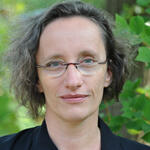Outstanding ECRC cardiologists
The German Society for Muscular Diseases e.V. (DGM) has jointly awarded Professor Jeanette Schulz-Menger and Dr. Edyta Blaszczyk with the Ulrich Brodeßer FSHD Prize 2022. The two cardiologists of the Experimental and Clinical Research Center (ECRC) are being honored for their study on cardiac involvement in the rare neuromuscular disease Fazio-Scapulo-Humeral Muscular Dystrophy (FSHD). The first prize of 10,000 euros was awarded during the FSHD Patient Day in Pforzheim on March 26, 2022.
Marion Haase (Chair of the FSHD Diagnostic Group), Dr. Edyta Blasczcyk (1st prize winner), Benjamin Bechtle (Board Member DGM), Dr. Stefanie Meyer (2nd prize winner) - from left to right.
Jeanette Schulz-Menger
Schulz-Menger heads the University Outpatient Clinic for Cardiology and the Cardiac Magnetic Resonance Imaging (MRI) Lab at the ECRC, a joint institution of the Charité - Universitätsmedizin Berlin and the Max Delbrück Center for Molecular Medicine in the Helmholtz Association (MDC). Dr. Blaszczyk also works in the university outpatient clinic as a specialist in cardiology. One of the team's research focuses is the detection and differentiation of myocardial changes in various systemic diseases using cardiovascular MRI. Together, the awardees are investigating cardiac involvement in the muscle disease FSHD. They cooperate closely with the research group of Professor Simone Spuler, which is studying FSHD neurologically. This allows personalized care for those affected and a rapid gain in knowledge.
The award-winning work focuses on the detection of myocardial damage in patients with FSHD and other hereditary muscular dystrophies. This includes regional fatty deposits and scarring.
At what point is a pacemaker necessary?
MRI scans show the changes in the heart, such as fatty deposits (circled)
Jeanette Schulz-Menger has received the Ulrich Brodeßer FSHD Award for the second time. The work recognized in 2018 revealed changes in the heart in about a quarter of patients with FSHD. In subsequent years, they have been carefully followed up to better understand the significance of the changes. During this short period since 2018, the team has been able to show not only that cardiac performance deteriorates, but that fatty or scarring remodeling of the heart in particular is associated with the emergence of cardiac rhythm and performance changes. Using cardiac MRI, it is now possible to better individually assess in various muscular dystrophies when is the right time to implant a pacemaker or defibrillator in patients, many of whom are still very young. The funding provided by the award is intended to help boost these approaches.
The DGM is the largest and oldest German self-help organization for people with neuromuscular diseases. The Ulrich Brodeßer FSHD Prize was endowed by DGM member Ulrich Brodeßer, who died in 2017, and is intended to promote research in the field of FSHD. Since 2018, the prize is awarded in two stages to recognize outstanding publications or research projects of the past two years.
Text: Charité
Further information
- Outpatient Clinic for Cardiology at the ECRC
- Research on Muscular Dystrophies
- Experimental and Clinical Research Center (ECRC) of the MDC and Charité Berlin
- Deutsche Gesellschaft für Muskelkranke
Literature
Edyta Blaszczyk et al. (2021): „Progressive myocardial injury in myotonic dystrophy type II and facioscapulohumeral muscular dystrophy 1: a cardiovascular magnetic resonance follow-up study“. In: Journal of Cardiovascular Magnetic Resonance. DOI: 10.1186/s12968-021-00812-6.








